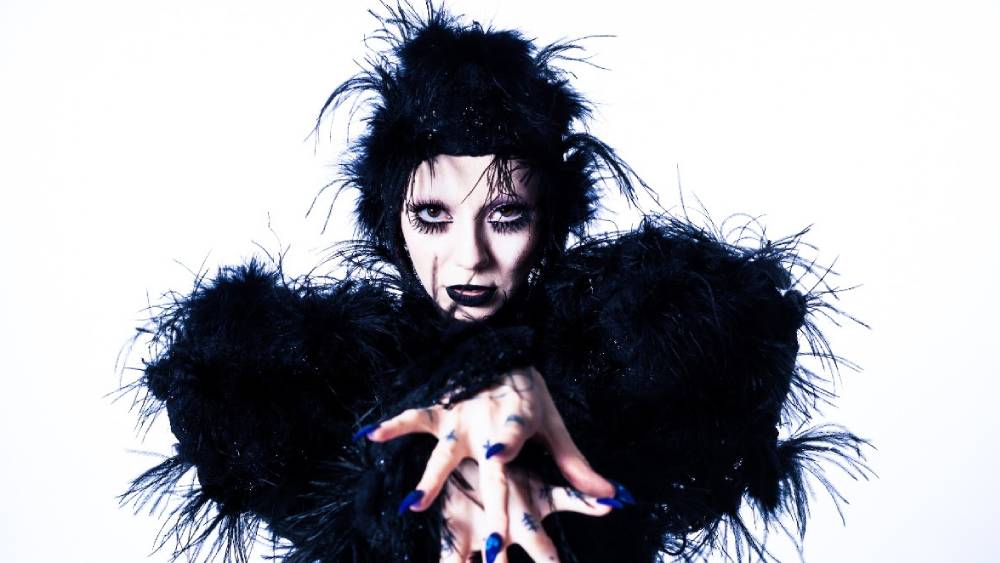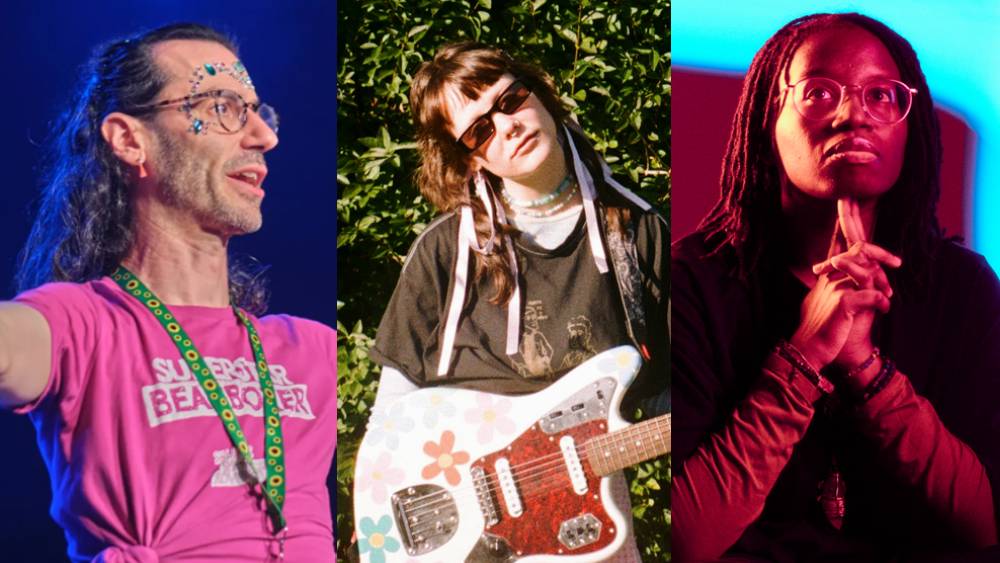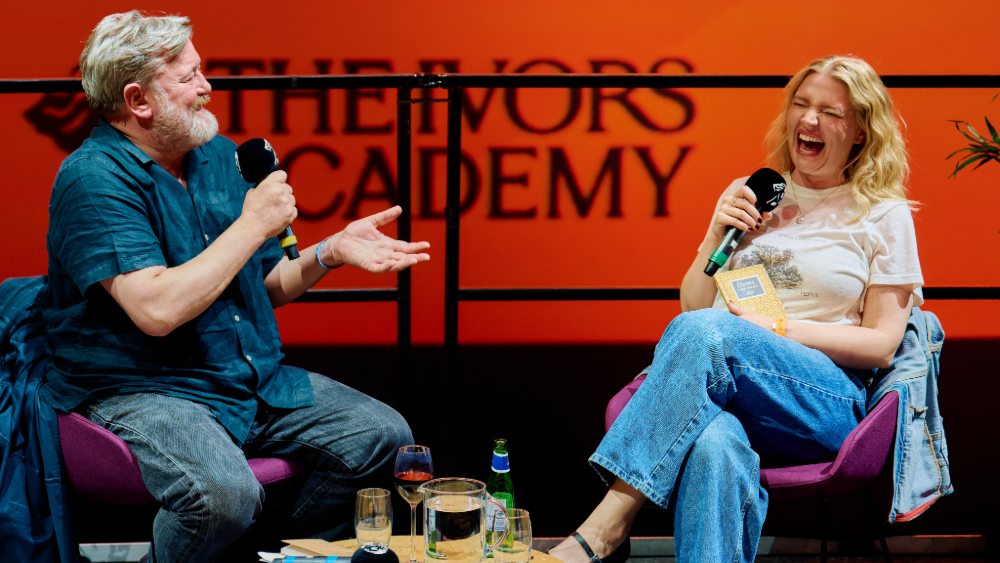To be trans today is to be under siege. Across the world, governments are rolling back our rights — including here in the UK. In April, the Supreme Court declared that the legal definition of ‘woman’ rests on biological sex alone, a move condemned as a dangerous regression by trans communities and allies alike.
But history refuses to forget us. Trans people have always existed — not as a trend or a phenomenon, but as artists, agitators, survivors and creators. In this hostile moment, music becomes so much more than just self-expression. To honour this, M spoke to some of the most exciting trans music creators working today about their influences and the legacy of the trans musicians who came before them.
‘It’s cathartic to direct the anger and helplessness that a lot of trans people feel right now into my music,’ pop-punk artist NOAHFINNCE tells M. ‘A lot of what I write about is about feeling like an outcast. If that makes people feel understood, then I’m happy. The people who feel most unwelcome in their day-to-day life can feel at home [with my music] and ready to take on the forces that make them feel not worthy of acceptance.'
‘It’s cathartic to direct the anger and helplessness that a lot of trans people feel right now into my music.' - NOAHFINNCE
It’s a defiant sentiment that is echoed by Telgate's Casper James: 'The music I’ve been writing lately has been far less focused on my transness — although with recent disruptions to our rights, that’s likely to change. But even with the music that isn’t directly about transness, simply existing, creating and being alive as a trans person will always be important in a world that tries to lock us in the shadows.’
When asked to name an inspirational trans artist from the past, both Casper and Noah cite punk rock legends. For the former, US artist Jayne County is a vital figure: ‘Sometimes credited as “one of the first outwardly trans women of punk”, Jayne caused ruptures in Andy Warhol’s Factory studio in New York, influenced the likes of David Bowie and Debbie Harry, and was on the frontline of the Stonewall riots. She was, and still is, fierce, unapologetic and the very definition of the “bad queer”. Having a trans artist to look up to who was unstoppable in unimaginable political conditions, stayed true to not appeasing the cis gaze and caused rifts without breaking the mainstream, has been so important to me.'
For Noah, who ‘grew up listening almost exclusively to punk music’, Against Me!’s Laura Jane Grace made a huge impact. ‘Hearing True Trans Soul Rebel for the first time gave me goosebumps,’ he says. ‘The lyrics “Who’s gonna take you home tonight? Does God bless your transsexual heart?” capture such an unexplainable pain that only trans people will really understand. To this day, I still haven’t found an artist that makes me feel that way.'
Artists like Princess Xixi and Mya Mehmi also embody this punk attitude through their refusal to dilute the way they express their transness in their music. Mya hopes to embolden trans people with the way she 'embraces all the things that make me trans in my art: my rich, deep voice, my complex emotions, my trauma and my pride. I hope that when a trans person listens to my music, they feel a little less alone walking down the street’.
Xixi has a similarly unapologetic approach, describing her music as 'exuding delicate femininity mixed with extreme big dick energy’. ‘I used to make music because I wanted desperately to be understood,’ she adds. ‘Now I make music so people can feel like I understand them.'
In a society that is seemingly working to erase us, having artists stand boldly in their transness without fear of being palatable is so powerful and important. For Mya, this is what Afro-Latina rapper Ms. Boogie represents: 'She never minces her words. In a world where trans people are only granted safety and acceptance by “blending in” and going “stealth”, she is so loud and proud about all the beautiful and challenging parts of being a doll. I personally feel so held by that as a listener — not to mention she could go toe to toe with any rapper I know.'
Xixi cites the influence of another New York rap heavyweight, Quay Dash: 'She's been super-influential on the way I rap. Her flow, cadence and delivery are so c**t, and her versatility on the mic is seriously underrated.’
'I hope that when a trans person listens to my music, they feel a little less alone walking down the street’. - Mya Mehmi
While Manchester-based singer-songwriter Jasmine.4.t shares her ‘anger at the state of things right now — we are all crying out for help,’ she remains ‘hopeful for a brighter future for trans people’. Alternative folk artist Zara Smile, who namechecks the 'amazing' Jasmine as one of their favourite trans artists, is similarly keen to keep pushing forward.
‘My main aim with my music is to create a community of people, specifically queer and trans people, who can come together and relate to the lyrics of my songs and talk about their experiences. It's been so lovely that it's all starting to happen!’ they tell M. ‘We have a little group chat and it's so wonderful chatting to everyone on there and getting to hear directly from my community. When the Supreme Court ruling announcement was made, we all supported each other through that.’
Self-proclaimed ‘goth musician and activist’ Aeris Houlihan (AKA Witch of the East) hopes that their work will speak to a range of different audiences at this crucial time.
'For cis audiences, I hope my music shakes them awake — consider it a lovingly aggressive wake-up call,’ Aeris explains. ‘For my fellow trans people, I want my music to be armour; a rallying cry; a glitter-drenched battle anthem. I want them to feel unstoppable, even when the world tells them to sit down and behave. Every bit of outrage only makes us more determined, more creative, and more visible.’
Visibility is certainly key. Multi-instrumentalist and composer Branwen Munn points to the impact that Grammy-winning trans musician Wendy Carlos (who composed the scores for The Shining, A Clockwork Orange and Tron) had on her growing up. 'Being a teenager in the ‘80s and a lover of synths, to discover that one of the pioneers of electronic music was also a trans woman — who had successfully transitioned by hook or by crook at a time when it must have been such a challenge — just blows my mind,’ she explains. Branwen now hopes that her own music might help ‘someone feel just a little bit closer to their own authentic self, whoever they may be'.
One of the most celebrated trans artists of all time is the late producer, songwriter and DJ SOPHIE, who worked with the likes of Charli xcx, Madonna and Vince Staples. 'I bow down to SOPHIE,’ Aeris tells M. ‘She was the absolute queen of reshaping pop music into something otherworldly and powerful, and proof that trans artists won’t just go along with the mainstream. We belong front and centre, shaking the foundations of your neatly packaged world.’
Clair Le Couteur of Lunatraktors, meanwhile, points to 2005 Mercury Prize winner Anohni’s transition in the public eye as a pivotal moment for the trans community: 'I really can’t express how moved I am by her work, her voice, her bravery and her very public transition.’ Lunatraktors, Clair adds, are intent on exploring in their work 'how colonialism and dualism go hand in hand, and how systems of oppression are so rooted in binary distinctions, enforcing hard borders on soft territories’.
‘People who exist in borderlands are often seen as a threat to those systems,’ they continue. ‘Simply by being there you call into question the reality of that black-or-white approach. Perhaps that means as a trans artist you can’t help but be political.’
'SOPHIE was the absolute queen of reshaping pop music into something otherworldly and powerful.' - Aeris Houlihan
Walt Disco singer Jocelyn Si perfectly illustrates the politicisation of existing outside of these borders. 'In the past I would say I've been outwardly vague about my transness in my work at times,’ they tell M. ‘I guess I was trying to protect myself, but I think it just led to confusion and getting misgendered all the time. To an extent, I get it: I have this big baritone voice where I sound like some famous “male” singers from the past, so sometimes people put me in that box of the androgynous stars they grew up with.
‘But I need to wear it on my sleeve, and I want to say out loud: I'm a they/them trans dyke and I don't give a fuck if that's confusing to your Da or a Victorian child. I’m done feeling scared, and I'm the most sure of myself, in life and my career, I've ever been.'
Zhenia Purpurovsky of tAngerinecAt preaches a similar message of defiance and acceptance: ‘I want trans people to know that they can and should love themselves, even if society doesn’t accept them. I want them to be the light for their own life journey. I want people to support each other, because we are connected by one breath.'
Zhenia’s words speak to what’s so often missing from the cultural conversation around trans rights: humanity. Our identities and our bodies have been turned into battlegrounds — politicised, policed and picked apart. In the face of such erasure, trans artists are making music that insists on our existence. Every note and every lyric is proof that we’re still here. As every artist featured here reminds us: we have always been here, and we will always be here.
This article features in the latest special edition of M Magazine, which you can read in full here.





